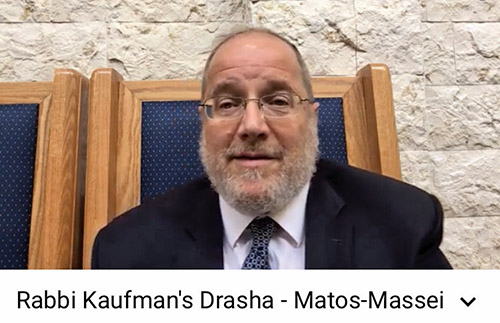

One of the things we look to from our rabbanim is informed, insightful and inspiring commentary on the Jewish seasons, coupled with an awareness of current events in the world. In this highly unusual time, when we are constrained from many of our regular forms of davening and learning together, the interpretative role of the rabbis has grown even more vital.
Two congregational rabbis in Middlesex County recently offered poignant perspectives not only on the spiritual potential inherent in the Three Weeks this year but also on how our observances can underscore things we’ve learned from our national response to COVID-19.
In his YouTube drasha for Parshas Matos/Masei, Rabbi Eliyahu Kaufman of Congregation Ohav Emeth in Highland Park comments on the halachos of hataras nedarim that appear in Parshas Matos. He notes that there is a related area of Jewish observance that has a profound message for the Three Weeks, especially in this year.
Rabbi Kaufman discusses the functions of hatovas chalom, the practices Chazal established for someone to follow when he has a troubling dream at night. The person who had the dream is instructed to seek out a talmid chacham or, if one is not available, to ask three balebatim to nullify the possible bad portent of the dream by interpreting it for the good.
Rabbi Kaufman notes that this practice is more broadly reflective of the challenges the Jewish people have faced throughout Jewish history. When faced with horrible tragedies—such as the Shoah, the oppression of Soviet Jewry, victims of current waves of anti-Semitism and other episodes—our mission is (in part) to find some good in the trials, to identify ways to “interpret” the bad occurrences into some positive result(s). Our role as Torah-true Jews is to transform a k’lala (curse) into a bracha.
Rabbi Kaufman suggested that this work of a Torah Jew is particularly relevant and necessary during the Three Weeks, when we mourn the loss of our Beis Hamikdash and must find ways to allow that loss, that k’lala, to spur us to become better Jews, so we may be a bracha. And this work is so much more important this year, in the Three Weeks of 5780, when we struggle with the added k’lala of the coronavirus.
Our mission is to find the ways that the restrictions we face, and the dangers we navigate, help us to become even more of a bracha—perhaps by appreciating the gift of life more, by davening with greater kavana, and by building our awareness of chasdei Hashem (the many kindnesses of HaKadosh Baruch Hu).
In a short video sent out via a shul WhatsApp group near the start of the Three Weeks, Rabbi Steven Miodownik of Congregation Ahavas Achim in Highland Park took a closer look at the scripturally based name given for this season on the Jewish calendar—Bein HaMetzarim (Between the Narrow Straits).
The phrase comes from the pasuk in Megillat Eicha (1:3), “She dwelt among the nations, but found no rest; all her pursuers overtook her in narrow straits.” The phrase conveys an inability to move, to escape—a feeling of being trapped.
This feeling of entrapment is one that we are familiar with, as a community, at this time. We have been confined to our spaces for months at a time now. We can’t go here, we can’t go there. That’s the national mood these days and it fits the Three Weeks all too well.
Rabbi Miodownik asserted that we must realize, though, that the feeling of being entrapped has a purpose. It is to remind us of our priorities. It reminds us of what we’re missing in our lives. And if we treat these narrow straits properly, we can merit the verse in Tehillim (118:5): “I cried out to Hashem from the narrow straits and He answered me with open spaces.” Our job is to cry out to Hashem with sincerity. He can answer us by opening the door to our deepest spiritual needs.
By Harry Glazer
�










